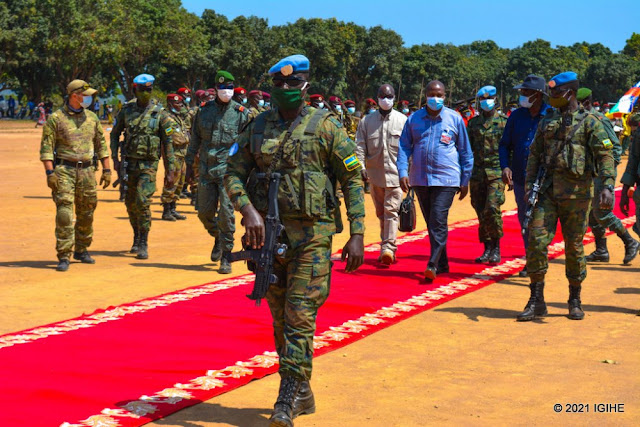The Central African Republic President, Faustin Archange Touadéra is protected by Rwandan Soldiers who took over the CAR’s republican guards (Photo: igihe.com)
Earlier in December 2020, Rwanda deployed force
protection troops to the Central African Republic. ‘’The deployment is in response
to the targeting of the Rwanda Defence Force (RDF) contingent under the UN
Peacekeeping force by rebels supported by François Bozize’’ The Rwanda’s
Ministry of Defence statement reads in line.
Rwandan contingent protects key state installations as
well as protecting high-ranking government officials starting from the
incumbent President Faustin Archange Touadéra and his family.
Speaking to reporters recently in Bangui, Lt Gen
Daniel Sidiki Traoré, The Force Commander of MINUSCA, commended RDF for doing
an outstanding job in helping the country find its footing after decades of
upheaval. Traoré noted that he has never heard of any security issue pertaining
to the security of the CAR Head of State, thanks to the Rwandans.
Rwanda Defence Force has become the world peacekeeping
giant due to its discipline and professionalism. This created a spirit of
cohesiveness between RDF troops and people in territories that they supposed to
protect. Having Rwandan troops in
peacekeeping missions enhanced image of UN peacekeepers that have been referred
to as ‘’armed tourists’’ in many instances.
The United Nations Peacekeepers have been criticized
for failure in some situations to protect the lives of citizens and their
property. The critics say that instead of ensuring that citizens who are under
their mandate are protected they sit back and watch.
But this is not the case with Rwanda Defence Force
which is among the top contributing countries around the world. Taking on what
is not possible to many and make it possible has made RDF transform the image
of peacekeepers.
In peacekeeping mission around the world, the RDF through
its strategy of citizen engagement, engages citizens in
territories under its control to participate in their security as well as
ensuring regular patrols. This has not only increased protection of the
citizens but has created a dialogue platform which facilitates reconciliation
and peace building, one of the core elements towards ending conflict.
With this, the United Nations has continued to credit
RDF. For example, the CAR President is protected by Rwandan Soldiers who took
over the CAR’s republican guards. The safety of that country’s head of State is
now in the hands of Rwandan Army.
Serving the society has also been one of Rwandan
peacekeepers top priorities whereas they construct infrastructures to help people
to access basic services. Amid the progress, the United Nations (UN) identified
RDF as a qualified Peacekeeping agent.
RDF: Heroes at home
We now count twenty-seven years since the then Rwanda
Patriotic Army, now RDF, which was led by President Paul Kagame halted the 1994
Genocide against the Tutsi that left over one million dead.
The image of the Juvenal Habyarimana’s Rwandan Armed
Forces (FAR) was characterized by brutality, ethnicity, and disregard for the
rights of the people that it was supposed to protect.
In 1994, FAR involved in the planning and execution of
the Genocide against the Tutsi. During this horrific period, the army
participated in acts of violations of
human rights: massacre, rape, and torture.
Rather than being the protector, it was the
destroyer of the people, especially the Tutsi.
After the 1994 Genocide, the victorious Rwanda
Patriotic Army (RPA) welcomed and integrated their defeated foes – the Ex-FAR –
into their ranks and jointly became part of the national army, now called
Rwanda Defence Force (RDF).
Under the leadership of President Paul Kagame, the
Commander-in-Chief of the RDF, the army has been transformed into a formidable
force.
In addition to bring and maintain peace and security,
the RDF has continued to play an active role in developmental activities that
have transformed the lives of ordinary citizens through activities like Army
Week, an outreach program where soldiers carry out voluntary service.
During this activity, Military travel to the remote parts
of the country to deliver health services, build classrooms and health centers
among others. These and many more activities are all geared towards uplifting
the social welfare of vulnerable Rwandans.
The success of the RDF is built on ensuring strict
discipline, fairness, and utmost professionalism, with the wellbeing of the
people being at its core.
Because of RDF’s perfection and competitiveness, safety
and security pillar remains the best performing pillar. For example, the 7th
edition of Rwanda Governance Scorecard published by Rwanda Governance Board
shows that safety and security registered a slight improvement with 95.44% form
94.29% in the 6th edition.
About the author
KARANGWA Janvier is a communication specialist. He holds a bachelor of arts in
journalism and communications from University of Rwanda.
 Reviewed by Karangwa Janvier
on
January 17, 2021
Rating:
Reviewed by Karangwa Janvier
on
January 17, 2021
Rating:



